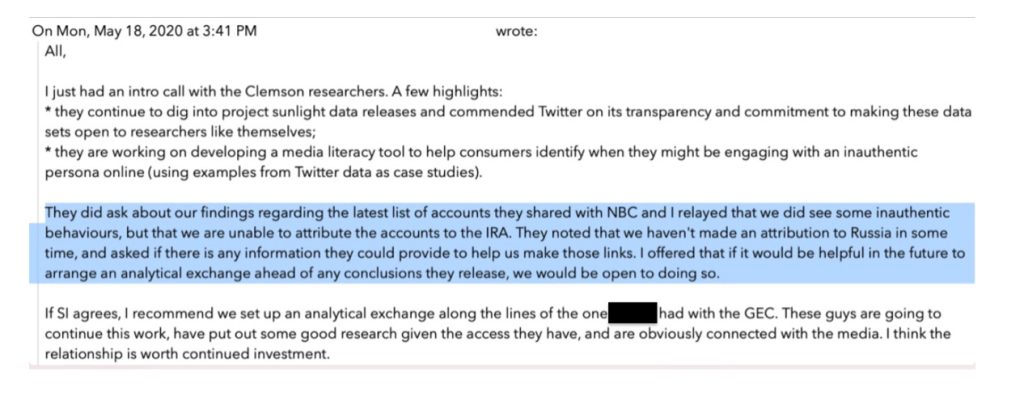Yves here. There’s been drinking-from-a-firehose level revelations from the Twitter files. Tom Neuburger goes though the latest batches, focusing on the most disturbing examples of Twitter subservience to censorship demands. These documents also show how troublingly cozy Twitter was with the CIA and FBI.
By Thomas Neuburger. Originally published at God’s Spies
Note from San Francisco FBI ASAC Elvis Chan to Yoel Roth, Twitter’s then-head of Trust and Safety
“When the government watches you twenty-four hours a day, you cannot use the word ‘liberty.’ That is the relationship between a master and a slave.”
—Chris Hedges, “America’s Theater of the Absurd”
Two more Twitter Files have dropped, both by Matt Taibbi. They should be considered together, as a set.
In addition to my summary, this piece contains links to the releases, brief descriptions, and two supplementary interviews Taibbi has given explaining them. These interviews add new information, so I suggest listening if this interests you.
‘Industry’ and the State: Partners in Crime
If you read these files through, and I hope you do, pay attention to how often the word “partner” is used.
The FBI refers to its “industry partners” in their communication to Twitter — meaning, I believe, social media companies in general. And Twitter executives frequently refer to “our partners at the FBI.”
So where does the state end and “industry” begin? I’m not sure I can tell you. I can tell you that a surveillance state is not a friendly operation. Consider the Chris Hedges quote at the top. To be constantly watched is to be constantly controlled. We’ve seen the watching, been watching it for years. Now we see one of the mechanisms of control.
There is, in fact, a word for when a government entangles itself with the activities of corporations. Consider Benito Mussolini in 1935, Fascism: Doctrine and Institutions, Rome: ‘Ardita’ Publishers (quoted here; emphasis mine):
The corporate State considers that private enterprise in the sphere of production is the most effective and usefu[l] instrument in the interest of the nation. In view of the fact that private organisation of production is a function of national concern, the organiser of the enterprise is responsible to the State for the direction given to production.
State intervention in economic production arises only when private initiative is lacking or insufficient, or when the political interests of the State are involved. This intervention may take the form of control, assistance or direct management. (pp. 135-136)
Corporate “production” in the modern world includes digital and online products.
Links to Twitter Files 11 & 12
To jump immediately to these files, click the links below. Discussions of previously released Twitter Files can be found here, here and here.
• Twitter Files 11 — How Twitter Let the Intelligence Community In
Matt Taibbi, January 3, 2023
A differently titled version is also published at Taibbi’s Substack site.
30. “REPORTERS NOW KNOW THIS IS A MODEL THAT WORKS”
This cycle – threatened legislation, wedded to scare headlines pushed by congressional/intel sources, followed by Twitter caving to moderation asks – would later be formalized in partnerships with federal law enforcement.
• Twitter Files 12 — Twitter and the FBI ‘Belly Button’
Matt Taibbi, January 3, 2023
A version is also published at Taibbi’s Substack site.
23. “BELLY BUTTON”
“We can give you everything we’re seeing from the FBI and USIC agencies,” Chan explained, but the DHS agency CISA “will know what’s going on in each state.” He went on to ask if industry could “rely on the FBI to be the belly button of the USG [U.S. government].
Links to Earlier Twitter Files
Links to all Twitter files can be found in the articles listed in the pulldown tab at the top of the God’s Spies main page:

There’s also a simple summary file here.
Twitter Files 11
Twitter Files 11 was titled “How Twitter Let the Intelligence Community In” when published on Twitter, and “Why Twitter Let the Intelligence Community In” when republished in essay form on Taibbi’s Substack site.
As Taibbi summarizes it, this set recaps “a furious fall of 2017 for Twitter, which began with threats of legislation and ended with the company surrendering control over content moderation.”
What’s notable is how the elements of the Democratic Party ecosystem seems to coordinate and amplify the attack by Sen. Warner (D-VA), who, as one Twitter executive writes, is “taking cues from Hillary Clinton.”
For example, here’s Politico:
https://t.co/Oh55WOIcIr the weeks after Warner’s presser, a torrent of stories sourced to the Intel Committee poured into the news, an example being Politico’s October 13, “Twitter deleted data potentially crucial to Russia probes.” pic.twitter.com/ZQLod4BRjl
— Matt Taibbi (@mtaibbi) January 3, 2023
And here’s a supposedly academic think tank at Johns Hopkins:
20.“Were Twitter a contractor for the FSB… they could not have built a more effective disinformation platform,” Johns Hopkins Professor (and Intel Committee “expert”) Thomas Rid told Politico. pic.twitter.com/J5Q3WYY3YI
— Matt Taibbi (@mtaibbi) January 3, 2023
To all of which pressure, Twitter caved:


The above, to my eye, is damning. It represents complete surrender to the security state.
Twitter Files 12
Twitter Files 12, “Twitter and the FBI ‘Belly Button’”, picks up exactly whereTF 11 leaves off:
https://t.co/C7kGNwToWZ 2020, Twitter was struggling with the problem of public and private agencies bypassing them and going straight to the media with lists of suspect accounts.
— Matt Taibbi (@mtaibbi) January 3, 2023
https://t.co/BcFhHCvjAE February, 2020, as COVID broke out, the Global Engagement Center – a fledgling analytic/intelligence arms of the State Department – went to the media with a report called, “Russian Disinformation Apparatus Taking Advantage of Coronavirus Concerns.” pic.twitter.com/KjUeE8vejt
— Matt Taibbi (@mtaibbi) January 3, 2023
The Global Engagement Center, as Taibbi says in his interviews (see below), is a Hillary Clinton-era creation within the State Department to give them their own presence in the foreign intelligence arena:
4. The GEC flagged accounts as “Russian personas and proxies” based on criteria like, “Describing the Coronavirus as an engineered bioweapon,” blaming “research conducted at the Wuhan institute,” and “attributing the appearance of the virus to the CIA.” [link to image in full tweet]
There’s also a reference to “Blaming Bill Gates” in the lists of sins that the GEC thinks should get a Twitter user banned. Is there any question the government is a domestic propaganda operation at this point? The floodgates to capricious “moderation” have been opened wide.
The highlighted comment in this document from Yoel Roth is telling. Note that the attack he’s responding to comes from another academic think tank, this time at Clemson.

Asking if there’s any information they could provide to “help us make those links” seems uncomfortably close to looking for non-existent votes in Georgia, but maybe that’s just me.
One further note about the State Department’s GEC — at this point in its life, it’s being led by the Trump administration.
By October, the number of requests from all over the place — “Treasury, the NSA, virtually every state, the HHS, from the FBI and DHS” — was overwhelming. The value of the requests ranged from help with help with what were described as foreign ransomware actors, to requests to ban a journalist at the request of Adam Schiff, Democratic Chair of the House Permanent Select Committee on Intelligence. Note that the Committee wanted to ban searches related to its staff members as well.
27.They also received an astonishing variety of requests from officials asking for individuals they didn’t like to be banned. Here, the office for Democrat and House Intel Committee chief Adam Schiff asks Twitter to ban journalist Paul Sperry: pic.twitter.com/SXI1ekqi13
— Matt Taibbi (@mtaibbi) January 3, 2023
Though Twitter declined these requests, it honored almost all of the others.
The rest of the thread details the overwhelming amount of work that Twitter was asked to do, and from every direction. It’s a stunning (and not difficult) read. A “master-canine” relationship indeed.

Taibbi ends by noting that even though Twitter was paid almost $3.5 million for what was essentially contract labor, “they were underpaid.”
Supplemental — Interviews Discussing Twitter Files 11 & 12
Taibbi has been making the rounds since these two releases. Here he discusses TF 11 and TF 12 with Ryan Grim, Washington bureau chief at the Intercept, and Emily Jashinsky, co-hosts of Counterpoints.
Note Grim’s questions. Also note that Taibbi says more here than he wrote in the Files themselves.
The Lee Fang story that Grim refers to is here.
And here’s a recent interview with Taibbi on Richard Eskow’s Zero Hourprogram. Again, good questions and answer that go beyond what’s said in the Files themselves.


